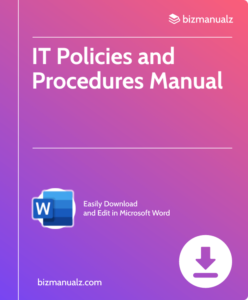What Organizations Offer Guidelines on Developing Information Security Policies?

In today’s digital landscape, organizations face an increasing number of cybersecurity threats. Developing robust information security policies is crucial for safeguarding sensitive data, protecting against cyberattacks, and ensuring compliance with industry regulations. Fortunately, there are several reputable organizations that offer valuable guidelines and frameworks to assist businesses in establishing effective information security policies. In this article, we will explore some of the prominent organizations that provide guidance on developing security policies and the resources they offer. What organizations offers guidelines on developing information security policies?
Organizations that offer Guidelines on Information Security Policies
Fortunately, there are reputable organizations that offer valuable guidance and frameworks to assist businesses in this endeavor. The National Institute of Standards and Technology (NIST), International Organization for Standardization (ISO), Center for Internet Security (CIS), Information Systems Audit and Control Association (ISACA), and SANS Institute are just a few of the prominent organizations that provide comprehensive resources and guidelines on developing information security policies.
-
National Institute of Standards and Technology (NIST)
The National Institute of Standards and Technology (NIST) is a renowned organization that plays a vital role in shaping cybersecurity standards and guidelines. NIST offers the widely recognized NIST Cybersecurity Framework (CSF), which provides a comprehensive framework for improving cybersecurity risk management.
The CSF assists organizations in developing information security policies by outlining five core functions: Identify, Protect, Detect, Respond, and Recover. It offers a flexible and scalable approach that can be tailored to the specific needs and risk profiles of different organizations.
-
International Organization for Standardization (ISO)
The International Organization for Standardization (ISO) is a globally recognized standard-setting body that offers guidelines and standards for various industries, including cybersecurity. ISO 27001 is the widely adopted standard for information security management systems.
It provides a systematic approach to developing security policies and implementing controls to manage information security risks effectively. ISO 27002, a companion guide to ISO 27001, offers detailed guidelines for implementing specific security controls and best practices.
-
Center for Internet Security (CIS)
The Center for Internet Security (CIS) is a nonprofit organization dedicated to enhancing cybersecurity readiness and resilience. CIS offers the CIS Controls, a set of prioritized security actions that provide practical guidance for organizations to establish and maintain effective security programs.
The CIS Controls cover various security domains, including inventory and control of hardware assets, continuous vulnerability management, and secure configuration for hardware and software.
-
Information Systems Audit and Control Association (ISACA)

The Information Systems Audit and Control Association (ISACA) is a professional association that focuses on IT governance, risk management, and cybersecurity. ISACA offers the COBIT (Control Objectives for Information and Related Technologies) framework, which provides comprehensive guidance on governance and management of enterprise IT.
COBIT helps organizations develop security policies by establishing a framework for aligning IT with business objectives, managing risks, and ensuring compliance.
-
SANS Institute
The SANS Institute is a leading organization that provides cybersecurity training, certification, and research. It offers a wealth of resources and guidelines on developing security policies through its Security Policy Project. The project provides templates, examples, and best practices for creating comprehensive security policies that address various aspects, including acceptable use, access control, incident response, and data protection. The SANS Institute’s resources are highly regarded within the cybersecurity community.
Guidelines on Developing Information Security Policies
Developing effective information security policies is vital for organizations to protect their assets, mitigate risks, and maintain regulatory compliance. By leveraging the expertise and best practices offered by these organizations, businesses can establish robust security policies to safeguard their information assets and strengthen their overall cybersecurity posture.
What Organizations Offer Guidelines on Developing Security Policies?
- National Institute of Standards and Technology (NIST)
- International Organization for Standardization (ISO)
- Center for Internet Security (CIS)
- Information Systems Audit and Control Association (ISACA)
- SANS Institute
















Leave a Reply